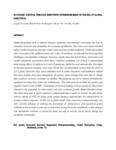| dc.description.abstract | Global disruptions such as natural disasters, epidemics and financial crisis affect the flow of economic processes and destabilize the economic equilibrium. They also cause unprecedented labour market distortions and may render many business models ineffective. Global disruptions affect every part of the global economy, the Covid-19 pandemic, for example has led to logistical challenges, unavailability of strategic resources, supply chain disconnectedness, severe price and market distortions, government restrictions, consumer pessimism, loss of trust in international trade among others. In relations to Covid-19 pandemic, Initial forecasts indicates that this might be the most adverse economic crisis since World War II, substantially serious than the 2008 to 2012 global financial crisis. Some industries such as online businesses and healthcare related may have profited from these disruptions. To survive, many existing firms have had to change their products, services, customers or markets. The pandemic has led to closure of businesses, employees working from home and redundancies. This study will discuss both the positive and negative impact of the COVID-19 pandemic on firms by looking at the processes by which firms respond to the pandemic in order sustain and even accelerate growth. Extant literature shows that firms have had to apply responsive entrepreneurship in order to survive. In spite of the adverse effects, COVID-19 brings forth unique business opportunities for entrepreneurs to develop creative responses. In this era of global health crisis, responsive entrepreneurship can offer creative solutions by utilizing the knowledge of entrepreneurs and innovation across multiple sectors in order to solve the current issues facing the society worldwide. A clear strategy and operational resilience is crucial for firms not only to survive, but to thrive, during this pandemic and beyond. | en_US |

